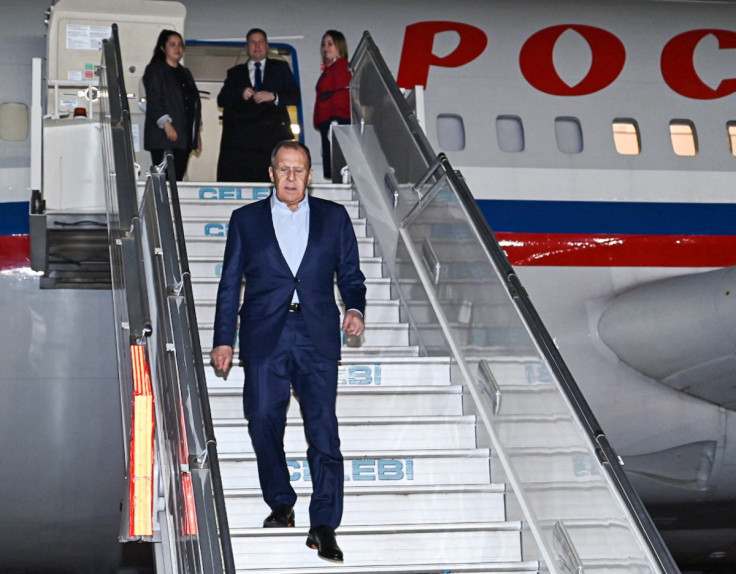Ukraine Clings To Bakhmut As Russians Advance

Ukrainian forces hung on to their positions in the ruined eastern city of Bakhmut early on Thursday under constant attack from Russian troops seeking to claim their first major victory for more than half a year.
Reuters heard the thump of outgoing artillery fire on Thursday morning from the town of Chasiv Yar, under Ukrainian control just west of Bakhmut.
In nearby towns and villages, fresh trenches had been dug on the roadside 20-40 metres (65-130 feet) apart, an apparent sign that Ukrainian forces were strengthening their defensive positions west of the city.
Bakhmut itself has been reduced to a blasted wasteland, with a few thousand of its 70,000 pre-war civilian population still living inside as armies battle street-by-street.
Russian troops, bolstered by hundreds of thousands of reservists called up last year, have been advancing north and south of the city, trying to cut off the remaining routes in and out to the west used by the Ukrainian garrison.
Moscow, which lost territory throughout the second half of 2022, says taking Bakhmut would be a step towards seizing the rest of the surrounding Donbas region, now a major aim of its year-old invasion.
Kyiv says the city has limited strategic value, but it is determined to hold it as long as possible to exhaust Russia's invasion force in what has become the bloodiest battle of the war.
"Sooner or later, we will probably have to leave Bakhmut. There is no sense in holding it at any cost," Ukrainian member of parliament Serhiy Rakhmanin said late on Wednesday.
"But for the moment, Bakhmut will be defended with several aims - firstly, to inflict as many Russian losses as possible and make Russia use its ammunition and resources."
SPRING MUD
Russian missiles crashed into a five-story apartment block in the southern city of Zaporizhzia overnight, collapsing the centre of the building.
As dawn broke, Reuters saw rescue workers carry the body of a man out of the wreckage. Police said at least three people had been killed, four were wounded and 11 were rescued alive. Evacuated residents, in shock, were being kept warm aboard a bus while crews tried to clear the debris.
An international team of war crimes investigators said on Thursday that the Russian state had funded and operated a network of at least 20 torture chambers during its eight-month occupation of Kherson, recaptured last year by Ukrainian forces.
Russia's aim was to "subjugate, re-educate or kill Ukrainian civic leaders and ordinary dissenters", the team said.
Moscow has denied abusing civilians in occupied areas and intentionally targeting them in attacks. The Kremlin did not immediately respond to a Reuters request for comment.
Russian forces are under pressure to secure advances now, before warmer weather brings the region's season of sucking black mud - "bezdorizhzhia" in Ukrainian, "raputitsa" in Russian - legendary in military history for destroying armies attempting to attack across Ukraine and western Russia.
Already, the ground is thawing by day. In an intelligence update, Britain predicted conditions for driving heavy armour would be at their worst by late March, especially over the ground near Bakhmut already churned up by the battle.
Kyiv says the arrival of spring means Moscow has failed to freeze Ukraine into submission, despite targeting its energy infrastructure with missiles since October.
"Winter is over. It was a very difficult one and every Ukrainian, without exaggeration, felt the difficulties. But we managed to provide Ukraine with energy and heat," President Volodymyr Zelenskiy said in his overnight video message.
Kyiv, for its part, is focusing on defence for now, planning a counteroffensive later this year to recapture the nearly one-fifth of the country occupied by Russian troops.
The West has promised tens of billions of dollars in new weapons, including tanks and armoured vehicles expected in coming months when the mud will again be dry.
Apart from the vicinity of Bakhmut, Russia has achieved little in its winter advance, with notable costly failures, especially to the south at Vuhledar.
Western countries and Russian pro-war bloggers say entire brigades of thousands of elite Russian marines were decimated and scores of tanks and armoured vehicle were destroyed in failed attempts to storm a strategic Ukrainian bastion there in February.
WAR DOMINATES G20 MEET
The war has dominated a foreign ministers' meeting in New Delhi of the G20 group of big economies, one of the last international forums left involving top Western officials where Russia is still invited. U.S. and European delegates are pushing for a statement that will contain condemnation of the war.
"Unfortunately, this meeting has again been marred by Russia's unprovoked and unjustified war against Ukraine, deliberate campaign of destruction against civilian targets, and its attack on the core principles of the UN Charter," U.S. Secretary of State Antony Blinken said.
Russia suspended its last remaining nuclear arms control treat with the U.S. last week. Deputy Foreign Minister Sergei Ryabkov said on Thursday Moscow had been forced to do so because Washington was using information gained under the New START treaty to help Ukraine attack Russian strategic sites.
A Russian defence ministry journal said Moscow was developing a new type of military strategy using nuclear weapons to protect against possible U.S. aggression, RIA news agency reported.
The article was the latest in a series of combative remarks by Russian politicians that have suggested Russia would be prepared to deploy its nuclear arsenal.
Kyiv dismisses the threats as bluster to intimidate the West into backing off from aiding its war effort.


© Copyright Thomson Reuters 2024. All rights reserved.




















